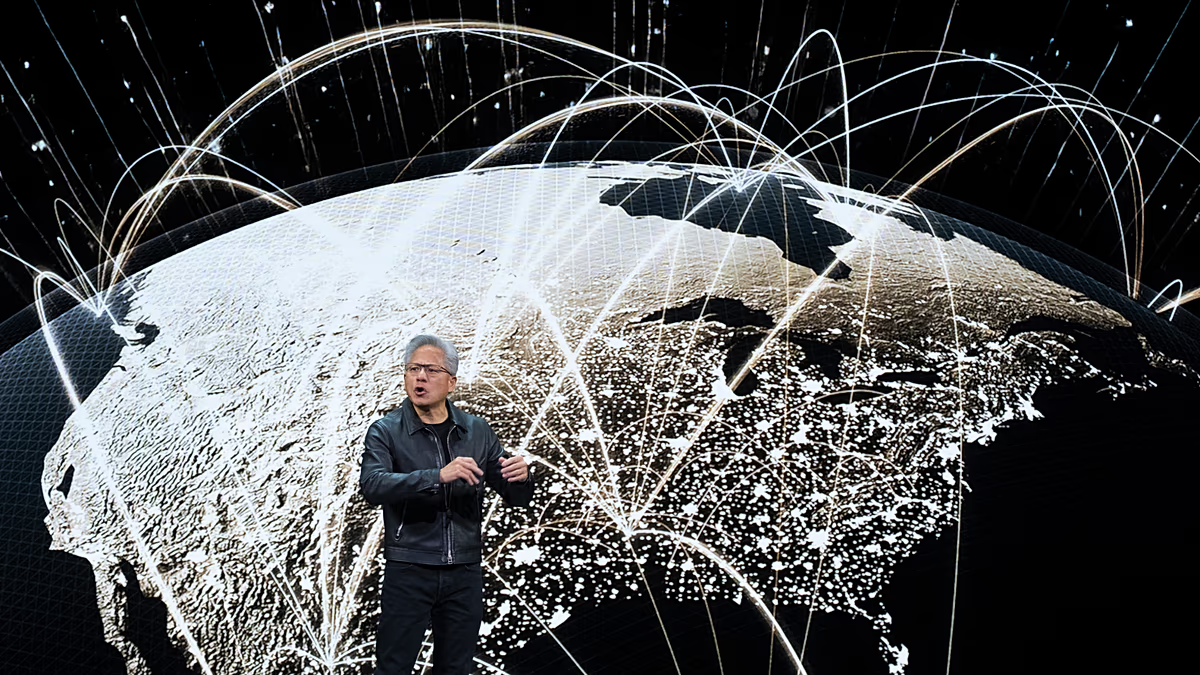Published on 29/10/2025 – 11:09 GMT+1
•Updated
11:11
Nvidia shares continued their dramatic rise this week as investors banked on an easing of semiconductor trade restrictions between the US and China.
Ahead of a meeting with Chinese President Xi Jinping on Thursday, US President Donald Trump said he planned to discuss Nvidia’s advanced Blackwell artificial intelligence chip with Xi.
“We’ll be speaking about Blackwell, it’s the super duper chip,” he told reporters on Wednesday.
The president didn’t elaborate on specific policy aims, although he said he was “very optimistic” about the meeting with his Chinese counterpart.
By around 11:00 CET, Nvidia shares had jumped over 3% in pre-market trading, bringing the firm closer to a $5 trillion market capitalisation.
Semiconductors have been a key point of contention between the US and China as both nations seek to lead on advanced technologies such as AI.
The tiny chips, used to power a range of electronic devices from smartphones to medical equipment, are essential to this ambition. Since 2022, the US has therefore restricted Nvidia’s sales of advanced chips to China for national security reasons.
Trump has flip-flopped on export controls since his arrival in the White House, first restricting and then approving sales of Nvidia’s H20 AI chip to China. Nvidia designed the H20 specifically for the Chinese market to comply with Biden-era export curbs, although the Trump administration previously said it was concerned the tech could be used for military purposes.
With regard to the Blackwell processor, Trump suggested months ago that he would consider allowing Nvidia to export a downgraded version of the chip to China.
Progress on such a proposal would come as a relief to Nvidia CEO Jensen Huang, who has long criticised US restrictions. Huang has notably argued that such curbs are boosting China’s AI capabilities as the Chinese market is forced to become less reliant on US products.
It seems that such logic is already understood in Beijing, even as the US softens its stance. After Washington gave the green light to H20 exports, China’s regulator banned the country’s biggest tech companies from buying Nvidia’s artificial intelligence chips.
“The president has licensed us to ship to China, but China has blocked us from being able to ship to China,” Huang said at a Nvidia event this week in Washington. “They’ve made it very clear that they don’t want Nvidia to be there right now.”
In a document released by Beijing on Tuesday, the Communist party reiterated the importance of self-sufficiency, calling for “extraordinary measures” to achieve “decisive breakthroughs” in technologies such as semiconductors.
“The most important factor in promoting high-quality development is to accelerate high-level scientific and technological self-reliance,” Xi said in a speech released by state news agency Xinhua.
While it’s possible that Chinese restrictions on Nvidia chips could be a long-lasting policy, experts have suggested that the move may be a bargaining chip in trade negotiations with Washington.
Such policy U-turns are creating uncertainty for investors despite the fact that Nvidia shares have risen roughly 50% this year, driven higher by AI ambitions.
